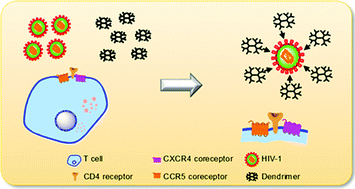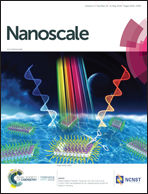New anionic poly(alkylideneamine) dendrimers as microbicide agents against HIV-1 infection†
Abstract
Acquired immune deficiency syndrome (AIDS) due to human immunodeficiency virus type-1 (HIV-1) represents one of the most important sexually transmitted infections (STI) worldwide. Great international efforts have been made to stop new infections but, to date, several compounds failed as microbicides at different stages of clinical trials. The quest to design new molecules that could prevent these infections is essential. In this work, we synthesized the first, second and third generations of anionic dendrimers having carboxylate and sulfonate terminal groups, respectively named G1C, G2C, G3C and G1S, G2S, and G3S, starting from a family of poly(alkylideneamine) dendrimers with nitrile termini. The anionic terminal groups of these dendrimers were expected to prompt them to act against HIV-1 infection. All dendrimers were fully characterized by 1H- and 13C-NMR, FTIR, MS and zeta potential techniques. Importantly, they were able to remain stable in the solid state and aqueous solutions at least for one and a half years. Screening of these six new dendrimers was then performed to shed light on their potential anti-HIV-1 activity and their mechanism of action. Results showed that the dendrimers were cytocompatible and that G1C and G1S dendrimers had important activity against R5-HIV-1NLAD8 and X4-HIV-1NL4.3 isolates by acting directly on viral particles and blocking their entry in host cells. Additionally, G1C and G1S dendrimers maintained their inhibitory effect at different pH values. Through a vaginal irritation assay carried out in BALB/c mice, the safety of these new dendrimers for topical application was also shown. Taken together, our results clearly show that G1C and G1S dendrimers are strong candidates for developing an effective microbicide to prevent HIV-1 new infections.



 Please wait while we load your content...
Please wait while we load your content...